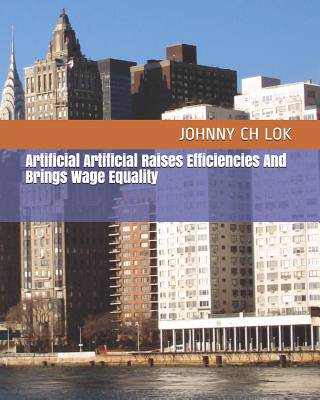
Bedankt voor het vertrouwen het afgelopen jaar! Om jou te bedanken bieden we GRATIS verzending (in België) aan op alles gedurende de hele maand januari.
- Afhalen na 1 uur in een winkel met voorraad
- Gratis thuislevering in België
- Ruim aanbod met 7 miljoen producten
Bedankt voor het vertrouwen het afgelopen jaar! Om jou te bedanken bieden we GRATIS verzending (in België) aan op alles gedurende de hele maand januari.
- Afhalen na 1 uur in een winkel met voorraad
- Gratis thuislevering in België
- Ruim aanbod met 7 miljoen producten
Zoeken
Artificial Artificial Raises Efficiencies And Brings Wage Equality
Johnny Ch Lok
€ 43,45
+ 86 punten
Omschrijving
This book divides two part: Artificial intelligence how raises efficiencies as well as how and why it can be influenced to bring to avoid wage inequality welfare. This book part first is concerned how to apply artificial intelligent machine or robot to raise productivive efficiency in factory. I shall assume that (AI) robotic can assist labours to raise productivities and bring raising efficiency. Then it brings these both questions as below: Research question: How to apply (AI) technology to raise labor efficiencies or productivities?Research question: Why and How (AI) technology can help employers to evaluate or measure whom has higher or lower productive efficiencies in order to evaluate the more reasonable or equal wages to every worker when it applies (AI) technology to assist labours to manufacture any products?The first part is intended to explain why and how (AI) technology and raising productivity or efficiency has close relationship. First part gives some artificial intelligence technologic concepts to indicate why and how (AI) can raise labor productive efficiency to assist labor to work in factories. This book first part is suitable to any managers have interest to learn how to apply (AI) technological productive method to achieve economic benefit in factories . In this part, the main important aim, I give examples to explain how to apply (AI) technology to raise labor productive efficiencies really.This book second part to explain why and how AI can bring advantages to organizations to reduce wage more inequality when they apply AI technology to assist labor to raise efficiencies. I shall indicate Japan, China, America three countries to explain they applied (AI) technology to assist labors to productivities, then they can raise efficiencies, even avoid the wage inequality causes. For example, why and how (AI) can reduce regular/non-regular wage gap when Japanese and Chinese manufacturing firms apply (AI) technology to raises efficiency as well as causes the wage is paid more fair to their labours. Also, I shall explain why and how any country's firm will bring more efficiency and more fair wage equality when they applied (AI) technology to assist labours to produce. Finally, I write this book aims to explain how the process of (AI) technologic robots field develops to assist employees to raise productive efficiencies. I shall indicate how and why book supplier and entertainment theme park and educational service example to explain how these service industries can apply (AI) robotic machines to assist employees whether (AI) can assist raise efficiencies as well as how and why these service industries can apply (AI) to assist teachers or entertainment service staff or warehouse book printing staff to bring the raising efficiencies benefit in order to evaluate their staffs whom has higher efficiencies or lower efficiencies to evaluate the more reasonable or equal wage consequently.
Specificaties
Betrokkenen
- Auteur(s):
- Uitgeverij:
Inhoud
- Aantal bladzijden:
- 102
- Taal:
- Engels
- Reeks:
Eigenschappen
- Productcode (EAN):
- 9781792817717
- Verschijningsdatum:
- 28/12/2018
- Uitvoering:
- Paperback
- Formaat:
- Trade paperback (VS)
- Afmetingen:
- 203 mm x 254 mm
- Gewicht:
- 299 g

Alleen bij Standaard Boekhandel
+ 86 punten op je klantenkaart van Standaard Boekhandel
Beoordelingen
We publiceren alleen reviews die voldoen aan de voorwaarden voor reviews. Bekijk onze voorwaarden voor reviews.












